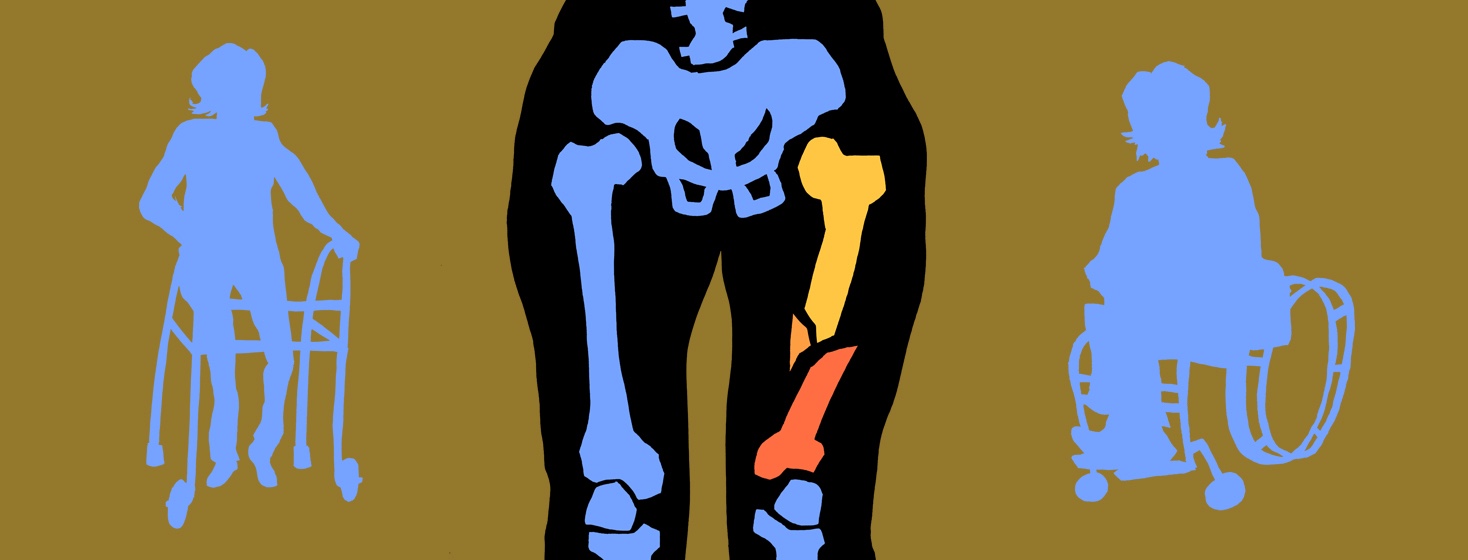Bone Health and NMO
Neuromyelitis optica spectrum disorder (NMO) is a rare inflammatory disease that affects the spinal cord, eye, and brain. Studies have found that people with NMO have an increased risk for weaker bones, falls, and bone fractures than those without the condition.1,2
What causes weaker bones in NMO?
There are several causes of weaker bones in NMO. The first is body positioning. NMO can cause pain and muscle spasms. These can impact a person’s posture and the way they are able to move. This can lead to increased stress on the bones and joints.3
If NMO symptoms are severe, a person may have very limited mobility. Being in a wheelchair or having reduced mobility also causes a person’s bones to get weaker over time.4
Plus, people with NMO are often treated with corticosteroids (steroids). Steroids are drugs that impact inflammation and help treat acute NMO attacks. They are sometimes used in lower doses for long-term treatment of NMO.5
Steroids are also used to treat other inflammatory or autoimmune conditions like lupus or rheumatoid arthritis. They are hormones that impact many functions in the body. One of these is bone health. Steroids impact how well the body absorbs calcium, which is necessary for strong bones. They also affect how often bones are broken down or built-up (bone turnover).6
Overall, people on long-term steroids are at high risk of having weaker bones. This weakening of bones is called osteoporosis.4,6
NMO and fall risk
When your bones are weaker, there is a greater chance you can break them if you fall. Major falls and large broken bones, like the in the hips or legs, can lead to significant issues. Research shows that the risk of disability or even death can increase after a major bone fracture.4
Because of this, it is important to study fall risk in people with lower bone density. In NMO, research has shown that those with the condition have more than double the risk of falling than those without. Fall risk seems to be greatest for those with higher pain scores, severe fatigue, and poor disability scores.2
Because people with NMO have a higher risk of both weaker bones and falls than those without the condition, they are also at risk for severe disability and poor outcomes that can come along with these.1-4
How is osteoporosis prevented?
Osteoporosis is a natural part of aging. It is most common among women and those with a family history of osteoporosis. It can be caused by drugs (like steroids), not enough nutrients in the diet, high alcohol consumption, lack of exercise, and more.4
However, there are steps you can take to reduce your risk of osteoporosis and improve bone health. Some of these include:4,6
- Getting enough calcium and vitamin D in your diet or from supplements
- Safely practicing both strength training and weight-bearing exercises, such as weight lifting, jogging, or walking
- Limiting the number of times you take steroids and only taking the lowest necessary dose
- Reducing alcohol intake
- Quitting smoking
- Taking hormone replacement therapy if you are a post-menopausal female (estrogen plays a role in bone health)
- Maintaining good posture whenever possible
If you have osteoporosis, it is important to reduce your risk of falls. Tips to prevent falls include:4,6
- Wearing non-heeled shoes with non-slip soles
- Installing hand grips in bathrooms or around the house
- Removing rugs or other tripping hazards
- Increasing light brightness in your home
How is osteoporosis treated?
If needed, your doctor may prescribe you drugs to treat osteoporosis. Many of these target the bone turnover process or calcium balance. Examples of osteoporosis drugs include:4,6
- Bisphosphonates, which are drugs that mimic the bone-strengthening effects of estrogen-like raloxifene
- Hormone replacement therapy for women
- Calcitonin, which slows bone breakdown
If you have osteoporosis, talk with your doctor about which treatment options are right for you.

Join the conversation